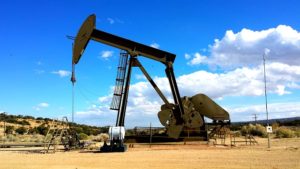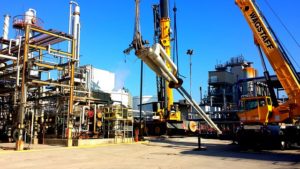Oil rigs are one of the most dangerous places to work in the entire world. Rates to get life insurance go up the moment you mention you work on an oil rig.
When oil rig accidents happen, workers and their families can find themselves left with too many bills to pay and not enough money to cover expenses. If you or a loved one has been injured or killed in an oil rig accident, you need the help of an expert.
We can help connect you with a lawyer that has a strong track record in bringing oil rig accident claims.
The United States is one of the world’s largest crude oil producers. American companies also routinely send specially trained American workers all over the globe to work on oil fields. While these jobs can be lucrative and adventurous, they can also be dangerous. If you have been hurt in an oil rig accident, you have a right to be compensated for your injuries.
Types of Oil Rig Accidents
 Because of the nature of the job, there will always be oil rig accidents. The heavy equipment, the presence of flammable and dangerous chemicals, and the long hours and tough conditions mean an accident can happen at any time.
Because of the nature of the job, there will always be oil rig accidents. The heavy equipment, the presence of flammable and dangerous chemicals, and the long hours and tough conditions mean an accident can happen at any time.
All you have to do is search the web to find pages and pages of descriptions of deadly oil rig accidents. Some type of human error causes most oil rig accidents. Some accidents are just the natural result of dangerous work.
Here are some types of oil rig accidents:
- Equipment failure
- Chemical spills or leaks
- Crush accidents from heavy equipment
- Improperly maintained equipment
- Fire from gas leak
- Explosion
- Drowning
- Slip and fall
- Caught in machinery
- Inhalation of toxic chemicals
- Accidents traveling to and from the rig
When humans cause oil rig accidents it is often because safety protocols are either ignored, or the company failed to provide adequate training or safety protocols to the oil rig workers. Sometimes oil rig accidents are the result of workers too tired or distracted to pay proper attention to the task at hand.
Oil rigs are often isolated and subject to extreme weather. Because the work is done in close quarters, and the rigs are tightly staffed, any oil rig accident has the potential to jeopardize the safety of everyone else.
Causes of Oil Rig Accidents
Oil rig accidents have many causes. For some types of compensation, the cause of the accident may not even matter. But, many times there will be multiple parties responsible for an oil rig accident, and families and workers may be able to make claims against several different parties to help get the compensation they deserve.
Some typical causes of oil rig accidents include:
- Manufacturing defects in the equipment
- Poorly maintained equipment
- Failure to institute proper safety precautions
- Defective design of equipment
- Weather conditions
- Drowsy workers
- Illegal drug use
- Miscommunication
- Slick surfaces
- Failure to follow safety protocols for chemicals
- Failure to pay proper attention
Many oil rig workers are covered by worker’s compensation policies that often do not require a finding for the causes of the accident to pay compensation. However, when a third party is at fault for an accident, such as an equipment company, understanding the cause of an accident can give you a better chance at a larger recovery for damages.
Types of Injuries in Oil Rig Accidents
Because of the nature of oil rig accidents, injuries are often catastrophic. Here are some types of typical oil rig accident injuries:
- Chemical/Fire Burns
- Traumatic head injuries
- Spinal cord injuries
- Drowning
- Fractured bones
- Amputated limbs or digits
- Permanent eye damage
- Torn ligaments and tendons
- Cancer from exposure to carcinogenic substances
 Many times the remote locations of oil rigs or severe weather delays proper medical treatment and can make injuries even worse. Oil rig accidents may involve dangerous chemical leaks or spills that make rescue difficult or impossible. If an injury is made worse because of the difficulty in getting proper medical care, that can factor into the compensation received for the injury.
Many times the remote locations of oil rigs or severe weather delays proper medical treatment and can make injuries even worse. Oil rig accidents may involve dangerous chemical leaks or spills that make rescue difficult or impossible. If an injury is made worse because of the difficulty in getting proper medical care, that can factor into the compensation received for the injury.
Regardless of what your injury is, after you have been hurt it is essential that you get proper medical treatment as soon as possible. You also have a duty in most cases to inform the employer of the work related injury as soon after the accident as practical.
If you do not seek treatment of properly report the accident, you could put your ability to recover damages for your injury at risk.
Understanding How to Make a Claim
Oil rig workers may be covered by a variety of different laws. Workers on certain types of offshore oil rigs may be covered by the Jones Act, a law that typically covers the crew of ships, but may also apply to oil rig workers under the right conditions.
Workers on some oil rigs don’t qualify for Jones Act coverage, but are instead covered by the Longshore and Harbor Workers Act of the High Seas Act. Some workers might be covered by private or state mandated worker’s compensation insurance.
 Each type of coverage has a specific list of requirements to see if you even qualify under the act. After you know what law to apply for benefits under, you still have to meet a complicated set of filing instructions. More than one law or worker’s compensation insurance policy may even cover some workers.
Each type of coverage has a specific list of requirements to see if you even qualify under the act. After you know what law to apply for benefits under, you still have to meet a complicated set of filing instructions. More than one law or worker’s compensation insurance policy may even cover some workers.
Most of the laws and worker’s compensation policies that do cover oil rig workers only compensate the workers for lost wages and medical costs. Things such as pain and suffering are not usually covered. Additionally, many of the laws prevent the oil rig workers from suing the employer for damages. Instead, the worker can get paid no matter who was at fault for the accident, but cannot sue for traditional personal injury damages.
Issues in Oil Rig Injury Claims
The most common way for oil rig workers to get compensated for injuries in oil rig accidents is through a state worker’s compensation system. Most of the time worker’s compensation systems pay out for death or injuries, regardless of who was at fault for the accident. While this may provide some help for families, these same laws often shield employers who were negligent from being sued for an accident.
Every state has different personal injury laws. In some places if the company or its employees were found to be grossly negligent, they are no longer shielded from personal injury lawsuits.
Other times, someone beside the company was at fault for the accident. In cases like these it may be possible to get worker’s compensation benefits and successfully file an injury claim against the responsible party.
Because people come from all over to work on an oil rig, to fight for a claim may mean finding a lawyer to handle the case that is local to the state the claim is being made and has experience in dealing with all of the complex legal issues involved in oil rig accidents.
Depending on where the oil rig was at the time of the accident, it can be difficult to even know what state has jurisdiction over the claim.
Third-Party Claims
Often in oil rig accidents, the employer is not responsible for the cause of the accident, or not solely responsible. When someone else, such as an equipment manufacturer or a contractor is at fault for the accident, a third-party claim can be filed.
This third-party claim allows oil rig workers to file a lawsuit for damages beyond what is covered by the Jones Act or other compensation law. Things like pain and suffering are recoverable in third-party claims.
The deadlines for bringing third-party claims can be very tight. Often, the longer you wait to start the process with a lawyer, the more difficult a case becomes and the less you are likely to recover.
What Kind of Lawyer Do You Need for an Oil rig claim?
Because the nature of oil rig claims are so complicated, you need a lawyer with specific oil rig injury experience. Often maritime injury lawyers have this type of experience. A regular worker’s compensation lawyer may not be able to help you get all of the compensation you are due. Likewise, a regular personal injury lawyer probably does not have the ability to navigate the different state and federal laws that govern compensation for oil rig workers.
Trying to figure out how to make a claim for your oil rig accident injury can be a nightmare. There is likely a patchwork of private insurance issues, federal, and state claims processes to figure out.
Do not try and deal with all of the red tape yourself. Let us help connect you to an experienced maritime injury attorney who has a track record of oil rig accident cases.

